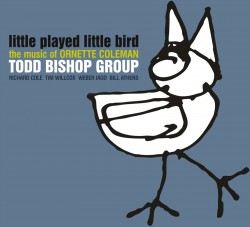MUSIC REVIEW BY C. Michael Bailey, All About Jazz
In the twilight days of the compact disc as a sound storage device, the most compelling reason for keeping what still seems a "new" audio media (compared to wax cylinders and 78s) in the face of purely electronic media is "concept" or "thematic" releases. One such example was drummer Todd Bishop's Pop Art 4 album, 69 Annee Erotique (Origin Records, 2009). This excellent release surveyed the music of French pop artist Serge Gainsbourg, music with popularity in Europe, little heard in the United States. Bishop used this collection of music as a vehicle for novel arrangements and improvisation, turning it into a more than familiar period sound and thereby achieving greater New World exposure for one of France's greatest artists.
Bishop has picked another enigmatic subject in Ornette Coleman, assembling a collection of never before covered compositions (save for "Lonely Woman"). Coleman's enigma extends to the disc's title, Little Played Little Bird. The "Little Played" represents the songs from Coleman's book that are rarely covered. Coleman was never called "Little Bird" like Sonny Stitt or Frank Morgan, but the association could not have been clearer. As it turns out, the name Ornette literally means "Little Eagle" or "Little Bird" in Old English. Bishop does with this repertoire what he did with the Gainsbourg material; he refracts it through the prism of his experience, making something new and vital.
The music selected by Bishop covers 1959's "Lonely Woman" from The Shape of Jazz to Come (Atlantic) to 1987's "Feet Music" from In All Languages (Caravan of Dreams). The band Bishop assembled to perform this rarified music is notable for the lack of an alto saxophone. Instead, Bishop heads up a quintet made up of Hristo Vitchev's pianist Weber Iago, bass reeds player Richard Cole, tenor and soprano saxophonist Tim Willcox, and bassist Bill Athens. In contrast to much of Coleman's work, Bishop's inclusion of Iago on piano lends a greater harmonic depth, and therefore, a foundation to these ruminative compositions.
Bishop's performances plumb the freedom inspired by Coleman while placing the composer's song in a postmodern light. Most notably, the plaintive alto wail that is the hallmark of "Lonely Woman" is conspicuously absent, the underlying theme presented instead by Willcox on tenor and Cole cleverly on bass clarinet. Iago plays nervous, percussive dances in the background. Iago's use of the Wurlitzer on "Friends and Neighbors" and "Country Town Blues" is very effective. For a collection based on music where the piano is anathema, Iago discharges himself admirably on both keyboards. The leader provides that vibe essential to the Coleman sound - that controlled chaos that so permeated post bop in the wake of John Coltrane's classic quartet and Miles Davis's second great quintet - freewheeling and solid.
Bishop has picked another enigmatic subject in Ornette Coleman, assembling a collection of never before covered compositions (save for "Lonely Woman"). Coleman's enigma extends to the disc's title, Little Played Little Bird. The "Little Played" represents the songs from Coleman's book that are rarely covered. Coleman was never called "Little Bird" like Sonny Stitt or Frank Morgan, but the association could not have been clearer. As it turns out, the name Ornette literally means "Little Eagle" or "Little Bird" in Old English. Bishop does with this repertoire what he did with the Gainsbourg material; he refracts it through the prism of his experience, making something new and vital.
The music selected by Bishop covers 1959's "Lonely Woman" from The Shape of Jazz to Come (Atlantic) to 1987's "Feet Music" from In All Languages (Caravan of Dreams). The band Bishop assembled to perform this rarified music is notable for the lack of an alto saxophone. Instead, Bishop heads up a quintet made up of Hristo Vitchev's pianist Weber Iago, bass reeds player Richard Cole, tenor and soprano saxophonist Tim Willcox, and bassist Bill Athens. In contrast to much of Coleman's work, Bishop's inclusion of Iago on piano lends a greater harmonic depth, and therefore, a foundation to these ruminative compositions.
Bishop's performances plumb the freedom inspired by Coleman while placing the composer's song in a postmodern light. Most notably, the plaintive alto wail that is the hallmark of "Lonely Woman" is conspicuously absent, the underlying theme presented instead by Willcox on tenor and Cole cleverly on bass clarinet. Iago plays nervous, percussive dances in the background. Iago's use of the Wurlitzer on "Friends and Neighbors" and "Country Town Blues" is very effective. For a collection based on music where the piano is anathema, Iago discharges himself admirably on both keyboards. The leader provides that vibe essential to the Coleman sound - that controlled chaos that so permeated post bop in the wake of John Coltrane's classic quartet and Miles Davis's second great quintet - freewheeling and solid.
Soundclips
Other Reviews of
"Little Played Little Bird":
L.A. Jazz Scene by Scott Yanow
Bird Is The Worm Jazz Blog by Dave Sumner
WYCE Music Journal by Rebecca Ruth
Sax Sounds Magazine (Spain) by Arion Molina
Jazz Society of Oregon by George Fendel
emusic Review by Dave Sumner
All About Jazz by Dan McClenaghan
